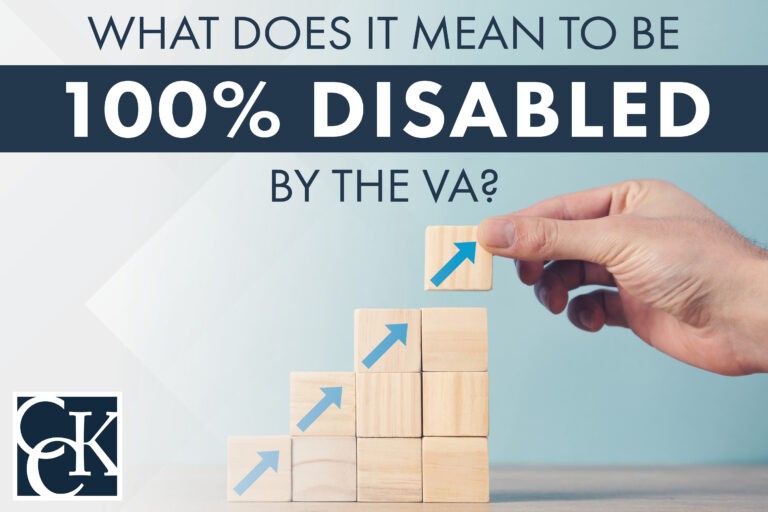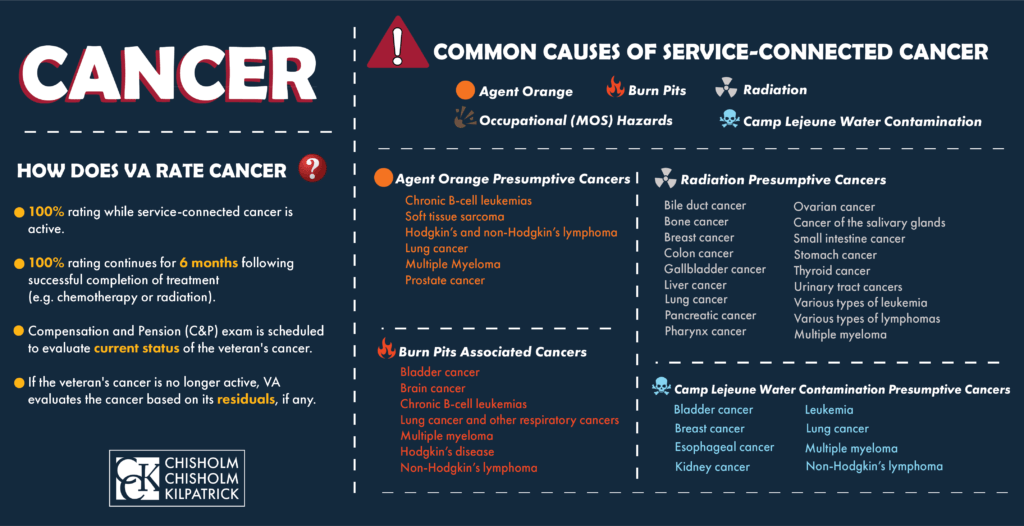What Does It Mean to Be 100% Disabled by the VA?

CCK Law: Our Vital Role in Veterans Law
One of the most common questions that we answer at Chisholm Chisholm & Kilpatrick is what the difference is between VA disability ratings. Not only does the amount of monetary compensation vary by rating, but many other benefits and programs become available at higher ratings. Therefore, veterans should work hard to ensure that claims and appeals capture the full extent of their service-connected conditions.
What does it mean to earn a VA disability rating of 100 percent? In this article, we’ll explore the benefits of a 100 percent VA rating, the various ways that VA might assess a veteran as totally disabled, and related questions that veterans frequently ask.
What Are VA Disability Ratings?
VA defines a disability as a physical or mental impairment that limits one or more major life activities. When a veteran becomes disabled due to their military service, they can file a disability claim with the Department of Veterans Affairs (VA).
After a review of the claim, VA will issue a rating decision to veterans with service-connected conditions. VA uses the Schedule for Rating Disabilities (VASRD) to assign diagnostic codes and disability ratings from 0 to 100 percent. Generally, the more severe a disability, the higher the disability rating. If a veteran has multiple service-connected conditions, VA combines the multiple ratings together using various criteria. A veteran’s combined disability rating determines their monthly compensation amount, which is intended to assist with lost earning potential.
As of December 1st, 2024, the VA disability rate benefit amounts are as follows:
- 0 percent disability rating: $0.00 per month
- 10 percent disability rating: $175.51 per month
- 20 percent disability rating: $346.95 per month
- 30 percent disability rating: $537.42 per month
- 40 percent disability rating: $774.16 per month
- 50 percent disability rating: $1,102.04 per month
- 60 percent disability rating: $1,395.93 per month
- 70 percent disability rating: $1,759.19 per month
- 80 percent disability rating: $2,044.89 per month
- 90 percent disability rating: $2,297.96 per month
- 100 percent disability rating: $3,831.30 per month
Monetary compensation is not the only potential disability benefit. For example, a 0 percent rating offers no monthly monetary compensation, but veterans with a 0 percent rating may be eligible for ancillary benefits like access to VA health care.
What Is a 100% Disability Rating?
A 100 percent disability rating, or total disability rating, is the highest rating VA can assign for service-connected compensation purposes. VA reserves this rating for veterans with extremely debilitating service-connected conditions. Typically, these conditions make them unable to work and mostly unable to care for themselves. However, veterans must meet strict criteria to qualify for this rating.

While a 100 percent rating is the highest schedular amount of disability compensation a veteran may receive, some may be eligible for additional compensation if their disabilities are especially severe.
What Are the Types of Total Disability Ratings?
There are actually several types of total disability. These include:
- 100% schedular VA disability rating: A 100 percent disability rating for one condition or multiple conditions.
- Total Disability Based on Individual Unemployability (TDIU): Veterans who are unable to secure and follow substantially gainful employment due to their service-connected conditions.
- Permanent and Total (P&T) VA disability rating: Veterans whose disabilities are total (rated 100 percent disabling by VA) and permanent (have zero or close to zero chance of improvement).
- Temporary 100% VA disability rating: Veterans who are rendered temporarily incapacitated due to a service-connected condition.
- 100% disability ratings for cancer: Veterans service-connected for active cancer should automatically receive a 100 percent disability rating. This rating continues for as long as the cancer is active, and then for another six months following the successful completion of a cancer treatment program, such as chemotherapy, radiation, or surgery. VA will then reevaluate based on residuals.
100% Schedular VA Disability Ratings
There are two ways in which veterans can receive a schedular 100 percent disability rating:
- A 100 percent rating based on one disability alone; or
- Multiple service-connected disabilities that combine to 100 percent.
However, it is important to note that disability ratings are not added together in the traditional way. Instead, VA uses its own form of math when combining disability ratings. To avoid doing VA math by hand, use our VA Disability Calculator.
Total Disability Based on Individual Unemployability (TDIU)
Total Disability Based on Individual Unemployability, or TDIU, is a benefit that allows veterans to be compensated at the 100 percent level even if their combined rating does not equal a schedular 100 percent. Unlike schedular ratings, TDIU simply asks whether veterans are unable to secure and follow a substantially gainful occupation as a result of their service-connected conditions.
At CCK, we often see circumstances in which a veteran is unable to work due to a combination of conditions that interact with each other in unfortunate ways. For example, a veteran might have a situation where their depression combines with their knee and back conditions to make them unable to work.
Like schedular 100 percent disability ratings, TDIU is not automatically permanent, but it can be granted permanent status. The veteran must apply for permanent status and demonstrate to VA that their service-connected conditions are not going to improve over time.
A permanent and total disability rating mean that VA has determined the veteran is both permanently and totally disabled. It is a classification that means veterans no longer need to attend Compensation and Pension (C&P) exams. In addition, veterans with permanent and total disability ratings are typically no longer subject to rating reductions. If you believe you are entitled to a permanent and total disability rating, you should apply through VA. If a veteran is rated permanent and total for a service-connected condition, there are several ways in which VA may notify them. In most cases, VA will indicate it in the decision letter. On some Rating Decisions, there is a Permanent and Total box that VA checks. On others, there may be language like “eligibility to Dependents Chapter 35 DEA/CHAMPVA are established” or “no future exams are scheduled”—both of which indicate permanence. The exact language may differ between VA Regional Offices. Veterans who are rendered temporarily incapacitated due to a service-connected condition may be entitled to receive temporary and total disability compensation equivalent to a 100 percent VA rating. VA offers three forms of temporary 100 percent disability ratings: If a veteran is service-connected for an active cancer, VA should automatically assign a 100 percent disability rating. This rating continues for as long as their cancer is active, and then for another six months following the successful completion of a treatment program (e.g., chemotherapy, radiation, or surgery). Six months after cancer treatment ends, VA will schedule the veteran for a C&P examination to evaluate their condition. If the C&P examination shows that their cancer is in remission, VA will then base the veteran’s rating on any residuals. Under the traditional rating scale for compensation, 100 percent is the highest rating you will receive for either an individual service-connected condition or combined service-connected conditions. However, there are certain circumstances in which veterans can receive additional forms of compensation due to particularly severe conditions. The most common example is special monthly compensation (SMC), which is awarded to veterans who have severe disabilities that cause additional burden beyond what is considered by schedular rating criteria. An example we see often at CCK is a veteran who needs to hire another person to provide aid so they can carry on their day-to-day life. VA offers totally disabled veterans a number of additional benefits besides direct financial compensation. Here are examples: We recommend that totally disabled veterans also look into state-offered benefits. Examples of state benefits for veterans may include: As a general rule, VA disability ratings at 100 percent are not automatically permanent. VA will likely schedule regular C&P exams to assess the veteran’s condition and update their rating. However, VA can grant a permanent status in certain situations. For example, VA will not reduce a 100 percent rating that has been in place for 20 years or more unless there is evidence of fraud in the initial rating assignment. VA can pursue a rating reduction if it is less than 20 years. To do so, there must be both material improvement and improvement under ordinary conditions. Moreover, VA cannot rely on a simple examination showing improvement when issuing a rating reduction. It is important to note that having a rating for 20 years does not automatically make it permanent. VA must determine that your rating cannot be subject to reduction after 20 years. If so, then your 100 percent rating will remain the same, i.e., “permanent.” Chisholm Chisholm & Kilpatrick LTD may be able to help you if VA denied you 100 percent disability. Our veterans law attorneys and accredited claim advocates have over 300 years of collective experience and are prepared to fight for your right to VA disability benefits. Call us today at (800) 544-9144 for a free case evaluation with a member of our team or reach out to us online. We will analyze your case and determine if we can assist you. Remember, your appeal is not something you must do on your own. If VA denies your claim for disability compensation, then we may be able to help.Permanent and Total VA Disability Rating
Temporary 100% VA Disability Rating
100% Disability Ratings for Cancer

Additional Benefits for 100% Disability Rating
Special Compensation Above 100 Percent Rating Amount

Other VA Benefits for 100% Disabled Veterans
State-Offered Benefits for Veterans
Are VA 100% Disability Ratings Permanent?
Call Chisholm Chisholm & Kilpatrick Today
Share this Post